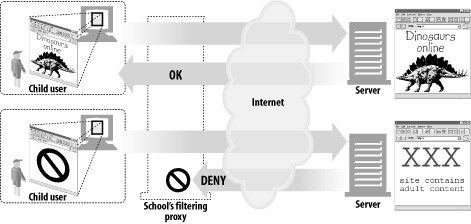HTTP: The Definitive Guide
by David Gourley, Brian Totty, Marjorie Sayer, Anshu Aggarwal, Sailu Reddy
Why Use Proxies?
Proxy servers can do all kinds of nifty and useful things. They can improve security, enhance performance, and save money. And because proxy servers can see and touch all the passing HTTP traffic, proxies can monitor and modify the traffic to implement many useful value-added web services. Here are examples of just a few of the ways proxies can be used:
- Child filter (Figure 6-3)
Elementary schools use filtering proxies to block access to adult content, while providing unhindered access to educational sites. As shown in Figure 6-3, the proxy might permit unrestricted access to educational content but forcibly deny access to sites that are inappropriate for children.[1]

Figure 6-3. Proxy application example: child-safe Internet filter
- Document access controller (Figure 6-4)
Proxy servers can be used to implement a uniform access-control strategy across a large set of web servers and web resources and to create an audit trail. This is useful in large corporate settings or other distributed bureaucracies.
All the access controls can be configured on the centralized proxy server, without requiring the access controls to be updated frequently on numerous web servers, of different makes and models, administered by different organizations.[2]
In Figure 6-4, the centralized access-control proxy:
Permits client 1 to access news pages from server A without restriction
Gives client ...